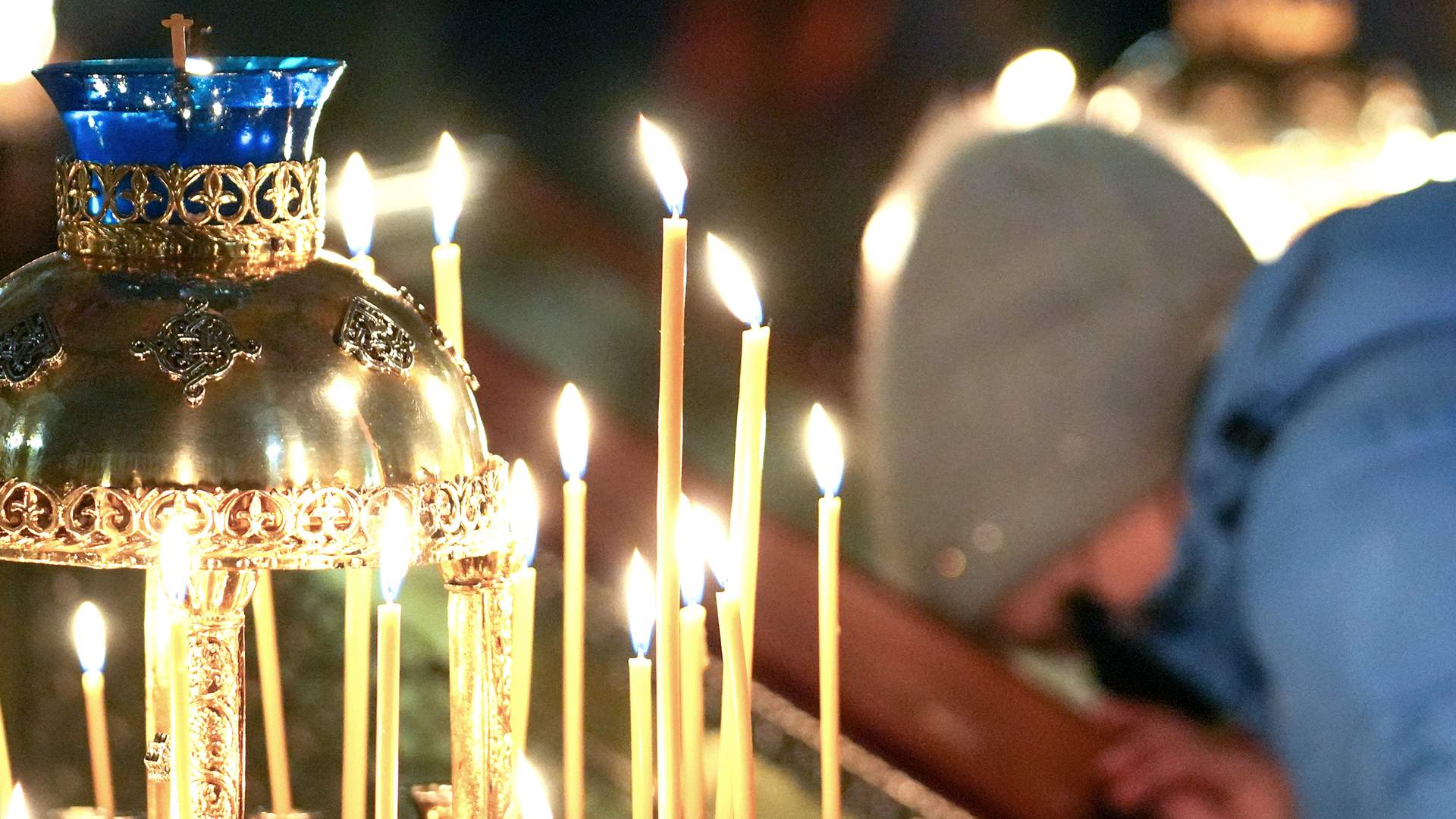Mighty woman: how to avoid misfortunes today, folk omens

On Thursday, February 20, the Orthodox Church celebrates the feast day of St. Luke of Hellas. The saint was known for his ascetic lifestyle and unwavering faith, for which the Lord endowed him with the gift of providence and healing. The feast was popularly known as Mighty Mighty: it was believed that on this day the eponymous herb lapchatka, known as Mighty Mushroom, became healing. On February 20 it was customary to commemorate the deceased and predict the weather, what will be the spring and summer. Read more about the Orthodox and folk traditions of the important holiday - in the material "Izvestia".
Mighty Woman: what is the holiday on February 20
On Thursday, February 20, the Orthodox Church honors the memory of St. Luke of Hellas - Greek monk, founder of the monastery Osios Loukas. In Orthodoxy, the saint is a model of righteous Christian life and unconditional devotion to God.
According to the hagiography of the saint, Luke of Hellas was born in 896 in the Greek Kastoria. He was brought up in a large family of poor farmers and from childhood was accustomed to labor. Already as a child Luke worked in the fields and looked after the livestock. In spite of his family's difficult financial situation, the boy often gave his food and clothes to the poor. Luke's parents were deeply religious people. They tried to bring up their son according to Christian precepts. Thanks to this, Luke from childhood was characterized by a good disposition and a desire for spiritual life. He preferred the solitary reading of prayers to noisy games with his peers.
After the death of his father, Luke decided to devote his life to God, taking a monastic tonsure from the pilgrim elders. At the age of 14, he left home and began to lead a secluded life in a cell at the Church of St. Cosmas and Damian in Vardusia. After seven years, Luke was forced to leave the shrine because of the invasion of the troops of the Bulgarian Tsar Simeon I. He first moved to Corinth, and afterward to Patras, where he humbly served the Christian ascetic for ten years. When the political situation stabilized, the saint returned to his homeland in Yannimaki, where he stayed for 12 years.
Wherever Luke stayed, there were his admirers everywhere. There are reports that the monk's prayer was so strong that he miraculously rose into the air while addressing God. Luke led a humble life, restricting himself in food and sleep, spending long hours in prayer.
For observing strict asceticism and showing great benevolence to people, Luke was endowed with the gift of providence and healing of mental and physical illnesses. The Monk healed various ailments through prayer and never refused to help anyone. It is known a case when Luke healed a mute boy, who after his prayer suddenly spoke. He also often helped people with advice, for which he became known as the comforter of souls.
However, constant meetings with visitors to the temple distracted Luke from his prayers and disturbed his solitude, so he decided to become a hermit, settling on the deserted island of Ampelon. The harsh climate, thirst and hunger severely undermined Luke's health. The monk became seriously ill and was on the verge of life and death. At that moment, the Lord appeared to him in a dream, who suggested to the monk a healing plant for his ailment.
When Luke recovered, he moved to the Helicon Mountains. There the monk, together with his followers, erected the church of St. Barbara; after Luke's death it became the large Orthodox monastery of Osios Lucas.
Until the end of his days Luke remained faithful to his monastic vows, being an example of humility and Christian virtue. And even after his death, the relics of the saint helped people heal from the most serious illnesses and find peace of mind. Luke was buried in his cell in 946, and later a memorial chapel was erected over this place.
According to folk traditions, the feast of Mogushchunitsa is celebrated on February 20. Its name is associated with the herb lapchatka, which has cross-shaped leaves. In translation from Latin, potentilla means "mighty", "strong", which is associated with the healing properties of the plant.
People believed that the cross-shaped lupus contains the power of the Holy Cross. According to legend, it was it that gave strength to Ilya Muromets in the battle with Solovy the Robber. A decoction of goosefoot leaves was used as an anti-inflammatory and diuretic, and ointments with the herb were rubbed into sore joints, applied to bruises and cuts. It was believed that it was on February 20, mogyshchnik acquires miraculous healing power.
Superstitions and prohibitions today, on the Orthodox holiday
In the churches on February 20, festive services are held. Believers come to the liturgy to honor the memory of the saint and thank him for his help. It is also customary to place candles before the icon of St. Luke of Hellas and ask him for health and help in affairs. Mogoshchunitsa is considered a day when it is important to remember the deceased. In the morning they went to cemeteries, where they cleaned the burial places of relatives and loved ones, leaving fresh flowers near the graves. At home they lit candles and prayed for the repose of the souls of the dead.
"If your parents are alive, honor them; if they are dead, remember them," they used to say.
Also on the feast day it is customary to read the life of the saint, remember his good deeds and miracles. It is believed that even the mention of St. Luke of Hellas brings blessing to the house. According to the belief, on this day the saint is especially attentive to the requests of the faithful. A prayer addressed to the saint can help solve the most difficult life situation, the ancestors believed.
On February 20, housewives were sure to bake pies with onions and herbs. Aromatic Lenten pastries were served to neighbors and friends. It was believed that such a ritual attracts happiness and prosperity to the house. Also on the day of the feast, it was obligatory to help the needy. Poor people were given food, things and money, as St. Luke himself once did. Ancestors believed that a good deed would change their lives for the better.
According to folk beliefs, it is absolutely impossible to quarrel, swear and harbor grudges on Mighty Woman. It was believed that everything bad on this day returns to the offenders a hundredfold. It was also forbidden to swear and gossip, as "washing bones" on this day could bring terrible misfortune.
Men were not allowed to do hard labor, as it was believed that household chores could turn out to be a failure. Women were forbidden to sew, wash and clean, because until recently housework took up a significant part of the day. The omen said that these household chores could "sew" or "wash out" happiness in the home, bringing discord to the family. It was also forbidden to take out the garbage. It was believed that together with garbage one could "throw away" prosperity from the house.
In addition, it was forbidden to celebrate weddings and noisy festivities, as Mighty Woman is a memorial day. It is believed that the celebration will lead to an unhappy family life of the young, and the marriage itself will not last long.
According to another prohibition, on the day of the holiday you can not lift other people's things on the street. Such items could bring trouble or illnesses into the house. Cutting hair and nails on this day was also forbidden. Ancestors believed that haircut could weaken the health of a person and deprive him of vitality. If on Mighty Woman one of the family members fell ill, it was believed that it was a test that God sent to the sick for sins. And if a person felt cheerful - it was a good sign, promising good health.
If in the house on Mighty Woman accidentally broke dishes - it was considered a sign of rapid changes, but not necessarily bad. To see a mouse or a rat in the house on this day was a bad omen. Rodents were considered harbingers of financial difficulties. Also during the celebration period, candles were scrutinized carefully. A smooth flame promised prosperity in the family, and a crackling and moving - quarrels and breakups.
On Mighty Woman it was customary to make decoctions and infusions of herbs, including the lapchatka herb, as well as dried roots collected in summer. Healing decoctions were drunk by the whole family instead of tea. It was believed that such a drink would strengthen health and protect a person from diseases for a whole year. Ancestors believed that Mighty Woman was a favorable time for spiritual purification, prayer and reflection on the meaning of life.
Omen of the day of February 20
In the olden days, it was believed that the folk holiday was a special day in which you could predict your future. If on the day of the celebration it was possible to see a falling star, then it was necessary to make a wish related to family or health. It was believed that it would definitely come true, and already this year.
If strange things happened on Mighty Woman - a bird flew into the house, a stranger came, or a missing thing was found - it was considered a sign of rapid change. Also on this day tried to memorize dreams, especially those related to water and bread. The ancestors believed that dreams on the Mighty Woman become things. Good dreams promised a happy year, and troubling ones - a great misfortune. To hear a dog barking on this day was a good sign, which meant the imminent appearance of a loved one who would bring pleasant news. To see a spider on Mighty Woman was also considered an auspicious event, promising an unexpected gift or profit. If a drink was accidentally spilled at the table on the day of the feast, a joyful event was expected, and if the left palm of the hand itched badly on that day, they were preparing for the arrival of guests.
If there were a lot of long icicles on the roofs of houses on the day of the feast - spring was expected not earlier than in a month, and a clear sky in the morning heralded a dry, sunny March. According to the natural features on the day of the feast they tried to predict what the weather would be in the coming spring and summer. If the sun shines brightly on Mighty Woman - spring will be early and warm, and if it snows - winter will drag on, and spring will come late. If on this day the crows caw louder than usual - there will be a heavy frost in late February, and if the jackdaws are circling in flocks - wait for warming soon.
Villagers paid special attention to weather omens, which could be used to predict the harvest. If snow falls in large flakes on February 20, the summer will be berry summer, especially rich in raspberries and blueberries, the ancestors believed. If the sun at sunset scarlet and bright - there will be a good harvest of apples and pears. If a strong wind blows from the east on Mighty Woman - there will be a lot of mushrooms in the forest, and if from the south - fruit trees this year will give especially sweet and large fruits. If it is warm and the snow melts on this day - a rich harvest of strawberries is expected, and if it is frosty and dry - vegetables.
Переведено сервисом «Яндекс Переводчик»











